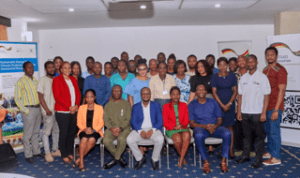By Sandra Agyeiwaa OTOO
Deutsche Gesellschaft für internationale Zusammenarbeit (GIZ) GmbH has hosted a masterclass training on climate change reporting for over 20 journalists in Accra.
Under the theme ‘Enhancing the Capacity of Journalists on Climate Change’, the training forms part of the 2025 World Radio Day celebration which aims to enhance the knowledge of journalists on climate change reporting.
The training also seeks to highlight key impact areas of the German Development Cooperation’s interventions in climate energy and just transition in Ghana.
Raymond Ahiadorme, Component Manager for Sustainable Energy for Climate Protection at Deutsche GIZ Ghana, emphasised the crucial role of media in driving awareness, education and engagement for effective climate action and solutions.
“We know that dissemination of information is also part of achieving climate action. If we support regulators, the private sector and other stakeholders without also supporting the media, our work will not be holistic enough,” he said.
“That’s why we are using this platform on World Radio Day to educate journalists who report on the environment and climate, so they can apply new trends in climate journalism to their work,” he added.
He stressed GIZ’s efforts in advancing sustainable energy initiatives across various sectors, including regulatory support, renewable energy integration, capacity-building and collaboration with key institutions for impactful implementation.
“We support the government on regulations, working closely with institutions such as the PURC and the Energy Commission. We also work on grid integration of renewable energy and capacity building on net metring,” Mr. Ahiadorme said.
“Through our collaboration with Technical and Vocational Education and Training (TVET) institutions, we are strengthening technical capacities in renewable energy and energy efficiency,” he concluded.
In a presentation, the Chief Executive Officer (CEO) of Blue Alliance, Michael Boateng, explained that natural factors like latitude, elevation and ocean currents influence climate by affecting heat distribution, which the atmosphere and oceans work to balance.
“The natural factors that affect the weather and, therefore, climate include latitude, elevation, nearby water bodies, ocean currents, topography, vegetation and prevailing wind. These factors receive and affect the sun’s rays differently and, thus, impact on the weather and climate.
When the heat of the sun reaches the earth, it does so in an uneven manner; which means there are parts of the earth that become hotter than others at any given time,” he revealed.
“This creates an imbalance, which the atmosphere and the oceans work together to correct by attempting to redistribute the heat evenly. These efforts by the atmosphere and the oceans give rise to weather and climate,” he added.
Mr. Boateng highlighted climate change effects, including heat rashes, respiratory diseases, heat waves, water-borne illnesses from polluted water sources and increased disease vectors like mosquitoes, worsening health risks in West Africa.
“Climate change has serious health impacts, including heat rashes, respiratory diseases and heat waves, leading to dehydration and heat stroke. Water-borne illnesses also rise due to excessive rainfall, flooding and drought, especially in parts of West Africa where access to clean water is limited,” he mentioned.
He said contaminated water from floods carries waste, chemicals and bacteria, causing diseases like cholera, typhoid and diarrhoea.

The responsibility for the planet – climate and energy: renewable energy and energy efficiency is one of the core priority areas of GIZ’s work in Ghana. GIZ’s work contributes to the objective implementation plan for Ghana’s Nationally Determined Contributions (NDCs) in the areas of renewable energy and energy efficiency and to the achievement of Sustainable Development Goals (SDGs) 13 on Climate Action and 7 on Affordable and Clean Energy.
Additionally, GIZ’s work in this sector promotes needs-based training and development among the target groups and beneficiaries.










